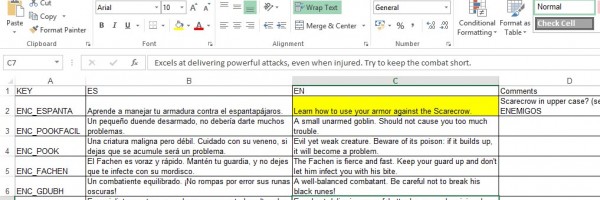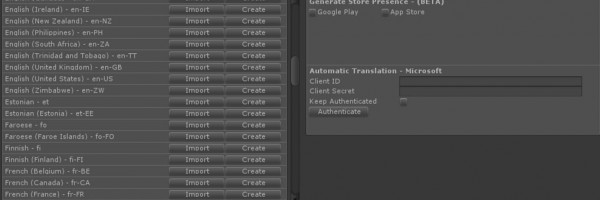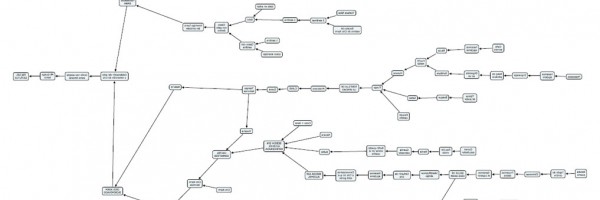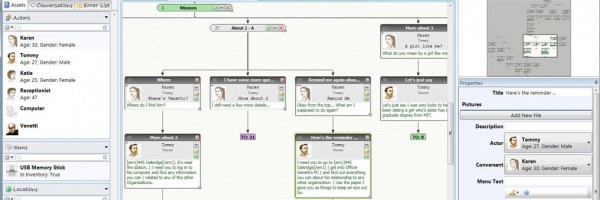When adding localization to your game, the pipeline is essential to the development. Not only when using localization, but generally it is good practice to have all the text in separate files so they are easily editable and you don’t need to edit the source code every time you need to change something. Here are some techniques used by developers:

Localization using Excel or Google Spreadsheets
Spreadsheets have been used for localization since its beginning, as they provide a structured and clear way to organize text. The common workflow is to write each conversation or dialogue line in a row, and use columns to add translations. Excel format is widely use as a exchange format when working with translation companies/services. You then usually export your data into a text file format (CSV, XML) to be read by your game. Reading data from the game is not usually easy. Depending on the game engine being used, this can be a complex task. Most of game engines available on the market such as Unity3D, Unreal Engine, Game Maker, already provide solutions or third party tools to do it. Some of them may be free, good ones would be commercial.

Building your own localization tool
In most of the cases, developers end up writing their own text editor with localization support, or writing their own script to read the spreadsheet files and place the conversations in the game. This is a widely used method, as the tool provides everything the game needs and it’s usually fast to edit and test right in the game. The downside is, they aren’t easy to author with. They’re often created by and for developers, so they are not suitable for script writers or translation companies. Most of the custom tools end up relying on spreadsheets as file format.

Branching Conversations
Most of the game dialogs are non linear. In a non linear dialog, the user is able to choose between phrases to make the conversation go in a particular direction. They are often used as part of the game experience, hiding clues or important information as part of the dialog. Also, the character or situation may turn depending on what the user says. For example, you could convince a guard to help you escape from a dungeon by finding something he wants in return, or you could make him angry if you don’t treat him correctly. Creating branching conversations requires some visual design in order to establish different paths the user could follow, and organize them so it’s not confusing. Writing them using traditional text authoring tools adds a lot of complexity to the task because of the lack of visual branching. Flowchart and mind map tools are also used, but they are usually difficult to author with and nodes usually aren’t big enough to write dialog lines. Needless to say, doing localization with branching conversations is even more complex.

Using a Branching Conversation Authoring Tool
Chat Mapper provides a very easy way to author simple or complex branching conversations and scenarios, with both a powerful visual and dialog editor. Writers can author dialogues using nodes with character pictures so it’s always clear who is talking. Branching is done almost automatically and the whole experience can be played using the Chat Mapper simulator. Experiences can also be shared with colleagues and testers, no plugin required, right in their browsers, using the new HTML5 publish feature. The HTML5 player also features Responsive Voice which allows real time multilanguage Text-to-Speech so authors can experience their conversations with voice. Doing Localization is simple in Chat Mapper. Unlimited languages can be added to the conversation and authors can add localized variations to each dialog node. When working with external localization professionals, Chat Mapper can export only the text to every major format used in the translation industry such as spreadsheet or text document. Therefore you can design your branching conversation in Chat Mapper, send the text to a localization team when it’s done, and add their translations back into your project by just importing the file. Chat Mapper is free to use for non-commercial projects. Major game brands and thousands of indie users are authoring their games with it. Make sure to check it out, once you’ve experienced how simple and powerful localization management can be with Chat Mapper, you’ll have your game translation under control and can add +1 to your sanity!